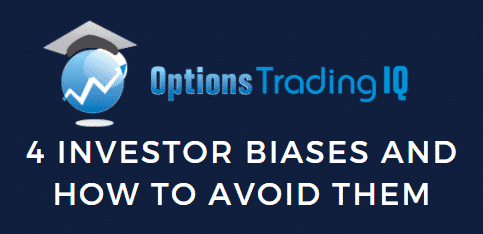

Contents
No matter how disciplined you might be as an investor, there are always unconscious biases that every human has that cause you to act on emotion.
The statement above is the basis of which a new field of study was created called behavioural finance, a combination of psychological theory and conventional economics.
The area of study predicts trading behaviour and is implemented as a foundational method of establishing more efficient trading strategies.
A UCLA study found that behavioural biases often affect trading decisions more than empirical data does.
Below are four of the biases measured by the study and brief descriptions about how to avoid them.
Reducing Regret
All investors have done this at least once – you were sure that a certain share was value-priced and had minimal downside potential.
You place the trade, but it slowly starts to work against you, still feeling like you were correct in purchasing the stock you don’t sell at a small loss because you believe it will increase.
After decreasing in value, you eventually sell at a major loss.
Behavioural economists call this pattern of investing ‘regret’.
Humans try to avoid regret as much as possible, so it is common to go to great lengths to avoid the feeling.
A study highlighted that investors were 1.5 to 2 times more likely to sell a profitable position too early and a losing position too late, to avoid feeling regret.
To avoid this bias, make sure to set rules that never change when it comes to investing.
If a stock position loses more than 7% of its value, close your position, similarly set a point to have your trading software automatically sell your positions if your gains reach a certain level.
Chasing Trends
Behavioural economists describe chasing trends as the strongest trading bias there is.
Researchers found that 38% of all new assets committed to mutual funds were deposited into the top 10% of funds from the previous year.
Although it is a legal requirement for funds to alert potential investors that past performance is not indicative of future results, this does not deter a majority of traders.
Humans love to detect patterns and once we do, we believe in their validity and automatically assume that they will remain constant.
Often patterns within the market are already priced in and even if a pattern is discovered, the market is far too random than most investors will care to admit.
The same UCLA study mentioned that investors who rely on past performance to make investing choices are often the poorest performing.
To avoid this bias simply be patient – do your research and understand what might cause the stock to move in both directions.
Patience is key.
Overconfidence
Overconfidence in trading manifests itself in two ways: overconfidence in the validity of your information and overconfidence on your ability to act on the information.
Research has shown that overconfident traders are less likely to engage in portfolio diversification.
One study referenced trades from 10,000 clients at a certain low-cost brokerage firm.
The hypothesis of the study was to determine if frequent trading led to higher returns.
The conclusion was stark – purchased stocks underperformed the sold stocks by over 5% for one year and 8.6% over two years.
Essentially, this highlights that the more active the investor, the less money they made.
Trade less and invest more frequently is the top way to avoid this form of bias.
When making a trade you are competing against experienced investors, so it is important to recognise that the odds are in their favour.
Investing will provide you with stronger long term results that trading would – remember that.
Limited Attention Span
There are thousands upon thousands of stocks available in the market, but no investor has the time or patience to search through them all to find the best one.
The theory of bounded rationality explains this bias perfectly – the theory states that humans make decisions based on the limited knowledge they can gain. Instead of making the most efficient decision, humans will make the most satisfactory one.
It is because of this that investors will only usually consider stocks that come across their table rather than researching what stocks will be best for them.
To avoid this bias attempt to do your research and ignore the news on certain well-performing stocks.
Invest in ‘hidden stocks’ that are well researched and watch the gains flow in.
Trade safe!
Disclaimer: The information above is for educational purposes only and should not be treated as investment advice. The strategy presented would not be suitable for investors who are not familiar with exchange traded options. Any readers interested in this strategy should do their own research and seek advice from a licensed financial adviser.










